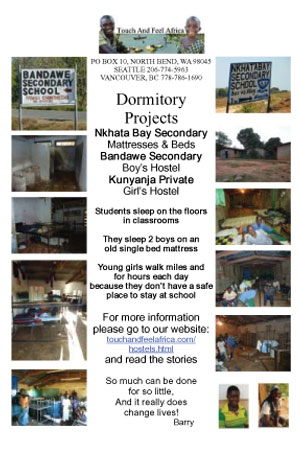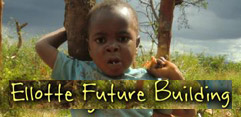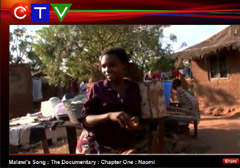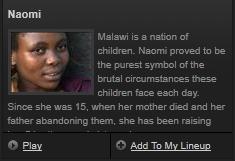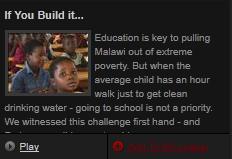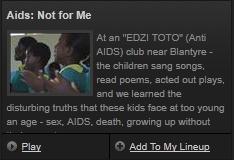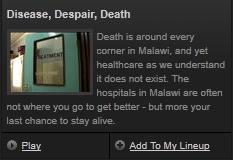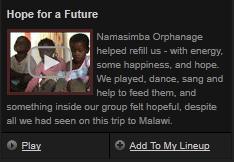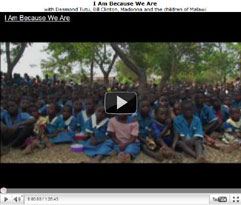

Goals for 2011 & 2012 The raising of $35,000 for the construction of a girls dorm for Kunjana School, addtional dorm facilities at Bandawe school and beds and mattresses for Nkhata Bay Secondary School. This is really needed, and the amount of money to make this all work is so small for the number of girls it will help. click for pdf
|
KUNYANJA PRIVATE SECONDARY SCHOOL
PROJECT LEGAL HOLDER : THE SCHOOL TRUST,
KUNYANJA
PRIVATE SECONDARY SCHOOL
P.O.
BOX 66
NKHATABAY
AIDS : Acquired Immuno Deficiency Syndrome
CDSS : Community Day Secondary School(s)
DEP : District Education Plan
HIV : Human Immuno Deficiency
JCE : Junior Certificate of Education
KMS : Kilometres
MANEB : Malawi National Examinations Board
MDG : Millennium Development Goals
MSCE : Malawi School Certificate of Education
PSLCE : Primary School Leaving Certificate Examinations
STDs : Sexually Transmitted Diseases
UN CRC : United Nations Convention on the Right of the Child
Malawi has one of the
worst records in the world in terms of secondary school enrolment at 24%. 60% of those that qualify for secondary
education every year, do not make it to public secondary schools due to limited
space. As a result, they end up
repeating their final year in primary school, creating a backlog of students,
or go to private schools if they can afford one. The rest just drop out of school. This denies a lot of deserving pupils their basic
right to education as provided for in the Bill of Rights in the Malawi
Constitution. A lot of good private
schools charge a staggering amount of tuition fees that is not affordable to an
average Malawian, however, they contribute a lot in supporting the government
in making secondary schools accessible to a considerable number of young
Malawians.
It is in this vein
that Kunyanja Private Secondary School was introduced in Nkhata Bay district of
the Northern Region of Malawi. The
school is not only one of the cheapest, but it offers quality education in
quite pleasant surroundings with impressive buildings and most of the
contemporary amenities like computers, for the 21st century student endowed
in Critical Thinking. The school has an
excellent repute in the community, however, one of the challenges is that the
results are not as impressive as the management would want them to be. Part of the reason for such a challenge is
that students travel long distances, at times over 20 kms to access the
school. This has resulted into some
school drop outs, with the girls being the worst affected.
It is for this reason
that the school has decided to build a contemporary girls’ hostel, as one way
of easing the burden on girls and encouraging girls to continue with their
education. Apart from the long distance
to school, girls are also affected by some harmful cultural practices and a
hoard of multifaceted problems that are exacerbated by their staying at home,
and which wouldn’t mostly occur, if the girls were in a boarding school.
It is equally
important that boys should also be in a boarding school as they also have
similar challenges. However, due to
financial constraints, and the fact that the level of vulnerability in the girl
child exceeds that of a boy, priority has been given to the girls, with the
belief that the next available funding would cater for a boys’ hostel.
Beneficiaries
The girl child will be
the primary beneficiary of the project, however, the parents, and the entire
community will also benefit indirectly. This will contribute largely to the development of the area and will be
able to offer employment to local people and offer a sense of ownership through
the community’s participation that would ensure ownership and acceptance of the
project in their area.
It is also hoped that
the success of the project could be internally replicated by having a boys’
hostel and could also be replicated externally and adopted as a best practice.
1.0 BACKGROUND
Kunyanja Private
Secondary School is one of the very few secondary schools in Nkhata Bay
district of Northern Malawi. It is
located in Mukandira Mng’oma village, Traditional Authority Mkumbira. Unlike most secondary schools in the country,
it boasts of impressive structures, a modern library that is well stocked with
books and computers. It is a relatively
new school that was established in 2004 and offers quality education at a very
affordable rate for local standards. The
school was created in order to address a huge need for the community in terms
of providing further education for its children. According to the District Education Plan
(DEP) report of 2008 to 2011
[1]
, there are 176 primary
schools in the district with over 73 000 pupils. Out of these, only less than 10% make it to
secondary school because of the few secondary schools that are available in the
district. Selection to secondary school
is therefore highly competitive, with the majority of those qualifying for
secondary education being male. The
school was therefore formed to complement the government’s effort in promoting
access to secondary education. The
following are some of the core objectives the school is premised on:
(a)
To promote government policy on education that is
equitable to all citizens regardless of gender, political, religious or ethnic
background
(b)
To assist the less privileged including orphans
to have access to good quality education
(c)
To encourage school drop outs to return to school
in order to attain desirable levels of educational qualification
(d)
To teach young people skills that help them prevent
the transmission of HIV/AIDS and other related STDs
(e)
To create opportunities for members of the
community in order to positively contribute to the national development and the
personal elevation of living standards
The school has an
enrolment of 235 pupils, with slightly more boys than girls. There are 119 boys against 116 girls. Like any typical secondary school in Malawi,
it provides four years of secondary education, Form 1 to 4. Students undertake their Junior Certificate
of Education (JCE) examinations after two years of secondary education, and they
sit for their O levels, Malawi School Certificate of Education (MSCE) in their
fourth year.
The most recent
results for MSCE had 36 students passing and 30 failing while for JCE, 71
passed and 40 failed. During Monitoring
and Evaluation of the school performance, the results indicated that the major
cause of failure was attributed to the long distances that the students had to
cover. In the worst scenario, students
had to walk over 20 kms each morning, every working day of the week, to school. This situation affects both boys and girls,
however, the worst affected are girls. This, therefore, has prompted the school to build a modern girls’ hostel
as one way of promoting education for the girl child in a country where
illiteracy levels are highest amongst female than their male counterpart, at
52%, resulting in both feminisation of poverty and feminisation of HIV/AIDS.
According to the DEP
report, the primary school enrolment for girls is lower than that of boys at 48%,
and the school dropout is also highest amongst girls, resulting in fewer girls
making it to secondary school.
2.0 Rationale
2.1 National Context
According to Jacobus
De Hoop’s
[2]
findings, (p.6), in 2005,
Malawi had the lowest net secondary enrolment in the world at 24%. Hoop believes this is because the education policy
in the country has concentrated so much on improving access to primary
education, with the introduction of free primary education in 1994 skyrocketing
the enrolment from 1.9 million to a whopping 2.9 million almost overnight,
making the capacity of the secondary school very limited. He also claims that
of the 100, 000 that qualify for secondary education, only 40% of those that successfully
complete their Primary School Leaving Certificate Examination (PSLCE) on annual
basis, make it to public secondary school. The country has two categories of public secondary schools, the
conventional boarding school which is the first tier and takes first class
students while the second tier known as Community Day Secondary Schools (CDSS),
takes students with lower grades. The
former are better schools in comparison to the latter. Those that do not qualify for public schools
either enrol in private secondary schools (which in most cases are even worse
than the CDSSs, or if they are better, they have exorbitant tuition fees).
Hoop (p.9) quotes that
in 2004, the Malawi National Examination Board (MANEB: which administers,
PSLCE, JCE and MSCE national examinations) data indicated that 150 748 pupils
wrote PSLCE and only 94 789 passed. However,
due to limited access to secondary schools, the Ministry of Education could
only accommodate 39 090 pupils, 11 900 of these went into conventional schools
while 27 190 were enrolled in CDSSs for the academic year 2005. Here, the disparities in enrolment into
conventional school as compared to a CDSS is evident. This shows that only a small percentage of
people have access to what is considered as quality secondary education since
conventional secondary schools are considered as the best.
In his comparison,
Hoop concludes that the students that perform the best and have a higher
retention capacity and a strong improvement in student learning are usually
those that come from the conventional school. Amongst his reasons, he cites availability of more teachers and
resources in comparison to other schools. By his own admission, he did not do any research into the pupil
background and capabilities. Such a
research, would have identified long distance as one of the core reasons as to
why students in CDSSs do not perform well or have a higher dropout rate, in
addition to his observation on lack of resources and human capital and overall
poor condition of these schools.
In most of these
schools, in terms of gender, it is the boys that perform well and are most
likely to secure a place in the university as compared to girls. Promoting education for the girl child must,
therefore, be a priority in any school programming since it is the girl that
suffers most in terms of fulfilling her right to education as stipulated in the
United Nations Convention on the Right of a Child (UN CRC), a right, which is
denied to most deserving young Malawians, especially girls, simply because
there aren’t enough secondary schools in the country. It is against such a background, that the
burning need to have Kunyanja Secondary School arose.
2.2 Nkhata Bay Context
The statistics in
Nkhata Bay indicate that between 2004 to 2008, more boys were selected to go to
secondary school than girls even in schools where there was more enrolment of
girls than boys. However, the number of
girls in each year was rising.
Figure 1
[3]
:
Selection of boys and girls to secondary school from 2004 to 2007
The following are some
of the reasons why there is lower enrolment and high drop out for girls in
comparison to boys:
(A)
Harmful cultural practices:
There are a number of
harmful cultural practices that affect the right to education for the girl
child. Girls are more involved in child
labour through domestic work than boys, and they are more likely to miss school
or turn up late for classes than their counterparts. They register a higher number of absenteeism
than boys. In terms of palliative care
or death in the family, the girls are more involved at home to take care of the
sick or the siblings following death especially of a parent. During puberty, when a girl starts
menstruating, traditionally she is supposed to stay at home for a week or more
than that secluded in a house with frequent visits from elderly women, teaching
her how to behave as a grown up. At
times, she is told to stay at home for a month or over until she gets her
second menstruation for fear that if boys or men at school walk behind her
back, she might never have her second menstruation. This indirectly acts as a sort of
advertisement to men that the girl is of an age and that she could marry. This has been one of the reasons for early
marriage. Through the same process, she
also fees too old and embarrassed to go back to school as she is made to
believe that she is different from younger girls, and is now a fully grown
woman.
In the past, parents
preferred to send boys to school than girls with the belief that girls will get
married, although this is no longer a common practice, when parents are faced
with the predicament of having to choose which child to send for further
education due to financial constraints, priority is still given to a boy
regardless of whether the girl is more intelligent than her brother.
(B)
Girls
lack role model hence motivation for pursuing further education
Most white collar
jobs, especially in the rural areas, are possessed by men. One of the most common jobs in the rural set
up is teaching. According to the DEP
report, only 26% of women are in this profession in Nkhata Bay district.
(C)
Long
distance to school
The government
recommends that there should be a school every 5 kms for children, however in
some cases children walk as long as 20 kms. Travelling such long distances has not only deterred the girl child, but
it has also been risky in that some girls have ended in being raped. In some cases, for instance in the rainy
season, when it is slippery and all wet, the journey to school is even more
difficult for the girl child. This is
one of the major reasons for the girl child’s lack of access to either primary
or secondary school.
(D)
Malawi has
a ‘return to school’ policy for girls who have ever been married or have
children. This policy is for both the
boy and the girl child. However, this
benefits boys more than it does girls. This is because girls are mostly ridiculed by the community, especially
if they commute to school on a daily basis than if they were in a boarding
school, away from judgemental eyes of the adult world.
This being the case,
Kunyanja Private Secondary School found it necessary to have a hostel for girls
as a way of promoting the girl’s education and protecting her from some of the
barriers like the ones cited above.
Goal
To have an increased
number of girls accessing quality secondary education there by mitigating the
circumstances of feminisation of poverty and HIV/AIDS and contributing in
achieving MDG 3 which aims at promoting gender equality and empowering women
and also MDG 4, MDG 5 and MDG 6.
Specific Objectives
1)
To have an
increased number of girls in the school by September, 2012
2)
To raise
awareness on the importance of sending a girl child to secondary school by
September, 2012
3)
To have a
modern girls’ hostel that could attract more girls to the school by September,
2012
The project will be beneficial
to the community not only by making sure that its girl children have access to
quality education, but it will also engage the community in the development of
the hostel as a way of ensuring ownership through volunteering, i.e. moulding
bricks but it will also offer employment to the local people, i.e. security
staff, boarding masters/mistress etc.
Project Operation
It is estimated that
all resources permitting, the project should take a maximum of 8 months, and
should be ready by early September 2012, in readiness for the new academic
year. The project will be managed by a
board of directors together with the headmaster. The project will recruit a contractor, who
will preferably bring his own team.
External Audit
An external Audit of
the project will be carried.
The School’s Track
Record
Kunyanja Private
Secondary School has successfully implemented a similar project since it has
built 4 classrooms, 2 laboratories, 1 library, in the past. It has competitively, with transparency and
accountability managed funds from previous donors like Masambiro Committee
based in the UK with MK17 000 000.00. According to our constitution, Article 8, any financial transactions
follow the following guidelines:
a)
All monies received by or on behalf of the Trust
shall be applied to further the aims of the Trust and no other purpose
b)
Monies received from donors shall be used in line
with any donor restrictions applied to it
c)
The general funds of the Trust shall be under the
control of the Board of Trustees. These
monies shall be allocated to the school or Project’s Management, and the
Management respectively shall manage and expand these monies in accordance with
the instructions of the Board of Trustees
d)
The Management may open a bank account subject to
the approval and instructions of the Board of Trustees, the cheques drawn
thereon to be signed in accordance with sub clause 8 hereof and shall submit
termly accounts in respect of the Trust to the Board of Trustees
e)
The Board of Trustees have responsibility for
maintaining proper books and financial records (as do the School and Project’s
Management)
f)
The accounts book or any other record of the
organisation shall be subject to audit annually by qualified, independent
auditors appointed by the members at the Annual General Meeting and arranged by
the Board Chair and Treasurer. All
audits shall take place in September of each year covering the preceding
academic calendar
g)
The Board of Trustees shall designate, and shall
be responsible for maintaining bank or bank accounts in which the general funds
of the Trust shall be deposited, either on current or interest bearing accounts
at its sole discretion
h)
Any bank accounts opened for the Trust shall be
in the name of the Trust
i)
Any cheques issued shall be signed by at least
three officers of the Board of Trustees (chairperson, secretary and
Treasurer). It should be stipulated that
there should be 3 signatories – at least one should not be employed by the
Trust. Also, all Masambiro funds
have to be signed off by the Masambiro representative on the Trust Board
plus at least one other board member
|
 |
 |
Visit our associate's websites! Volunteer for projects in Africa |
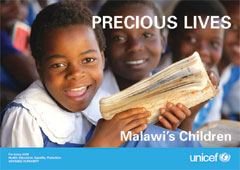 |
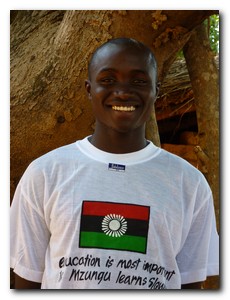 education is most important education is most importantthe Mzugu learns slowly |
|
The Malawi Education Foundation
is tax exempt under section 501 (c) (3) of the Internal Revenue Code
